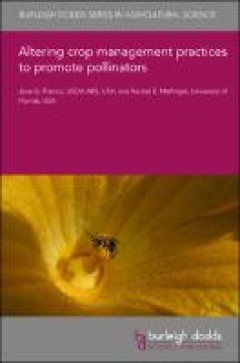Ditapis dengan

Altering Crop Management Practices to Promote Pollinators
Agricultural intensification, or the increase in crop production per unit of input or land area to meet the needs of a growing population, has resulted in a landscape dominated by large scale monoculture cropping. Pollinators, specifically, are impacted by the lack of diverse floral and habitat resources associated with this type of farming. Agriculture must develop practices that diversify the…
- Edisi
- -
- ISBN/ISSN
- 978-1-80146-098-9
- Deskripsi Fisik
- 23 hlm.
- Judul Seri
- -
- No. Panggil
- -

Agricultural Practices to Improve Soil Carbon Sequestration in Rice Paddy Soils
Paddy rice systems are characterized by waterlogged conditions with high potential for CH4 emissions and soil organic carbon (SOC) sequestration. Therefore, it is necessary to evaluate the net global warming potential (GWP) of soil management considering SOC stock changes, and CH4 and N2O fluxes. Green manure application and straw retention slightly enhanced SOC stock, but highly increased net …
- Edisi
- -
- ISBN/ISSN
- 978-1-80146-550-2
- Deskripsi Fisik
- 35 hlm.
- Judul Seri
- -
- No. Panggil
- -

Management of Organic Soils to Reduce Soil Organic Carbon Losses
Organic soils of intact peatlands store 1/4 of the global soil organic carbon (SOC). Despite being an important source of methane (CH4), they are climate coolers because they continuously accumulate new organic carbon. However, when these organic soils are drained for agriculture, the resulting aerobic conditions lead to fast decomposition of the peat and the release of carbon dioxide (CO2) and…
- Edisi
- -
- ISBN/ISSN
- 978-1-80146-324-9
- Deskripsi Fisik
- 65 hlm.
- Judul Seri
- -
- No. Panggil
- -

Sustainable Agricultural Practices-Impact on Soil Quality and Plant Health
Agricultural practices involving the excessive use of chemical fertilizers and pesticides pose major risks to the environment and to human health. The development and adoption of sustainable ecofriendly agricultural management to preserve and enhance the physical, chemical, and biological properties of soils and improve agroecosystem functions is a challenge for both scientists and farmers. The…
- Edisi
- -
- ISBN/ISSN
- 978-3-0365-3217-2
- Deskripsi Fisik
- 194 hlm.
- Judul Seri
- -
- No. Panggil
- -
 Karya Umum
Karya Umum  Filsafat
Filsafat  Agama
Agama  Ilmu-ilmu Sosial
Ilmu-ilmu Sosial  Bahasa
Bahasa  Ilmu-ilmu Murni
Ilmu-ilmu Murni  Ilmu-ilmu Terapan
Ilmu-ilmu Terapan  Kesenian, Hiburan, dan Olahraga
Kesenian, Hiburan, dan Olahraga  Kesusastraan
Kesusastraan  Geografi dan Sejarah
Geografi dan Sejarah